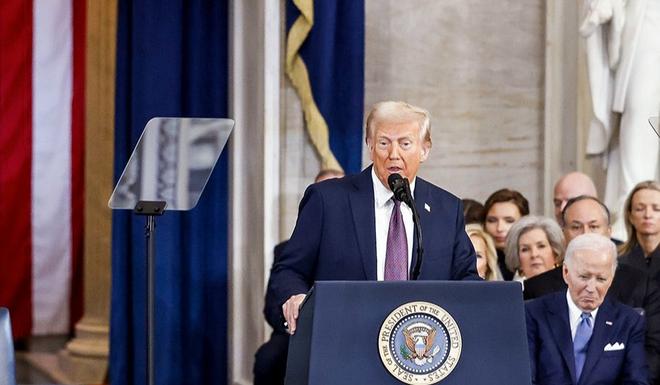Published 00:48 IST, January 24th 2025
US Federal Judge Blocks Trump's Birthright Citizenship Order, Calls It ‘Blatantly Unconstitutional’
US Federal Judge Blocks Trump's Birthright Citizenship Order, Calls It ‘Blatantly Unconstitutional’

A US federal judge has dealt a significant blow to President Donald Trump 's efforts to end birthright citizenship, blocking an executive order that aimed to deny automatic citizenship to certain individuals born in the United States. The order, which was signed by Trump on his first day in office, was described by the judge as “blatantly unconstitutional". Earlier, Trump signed an executive order seeking to limit birthright citizenship, targeting children born to non-citizen parents, including those on temporary visas or without legal status. However, the judge's ruling has put a halt to the implementation of this order.
US District Judge John Coughenour issued the temporary block after a request from four states led by Democrats. The judge’s decision prevents the Trump administration from moving forward with the order, at least for now.
Trump's executive order sparked a debate surrounding birthright citizenship, which only intensified the interpretation of the 14th Amendment, which grants citizenship to all individuals born or naturalised in the US. While some argue that the amendment's language allows for exceptions, others contend that it guarantees citizenship to anyone born on American soil, regardless of their parent's immigration status.
The order aimed to deny US citizenship to children born on American soil if neither of their parents is a US citizen or legal permanent resident. The order, if upheld, would have affected more than 150,000 children born annually in the US.
The deadline for the termination of birthright citizenship under Trump’s executive order was set for February 20.
Judge Coughenour’s decision came just one day after lawsuits were filed by several Democratic-led states and civil rights organisations, challenging the president’s attempt to change birthright citizenship policy. These lawsuits represent an early attempt by Trump’s opponents to block his policy agenda in court.
Judge Coughenour expressed his disbelief at the order's legality, telling a US Justice Department lawyer defending Trump’s stance, "I am having trouble understanding how a member of the bar could state unequivocally that this order is constitutional." He added, "It just boggles my mind. This is a blatantly unconstitutional order."
The order was met with strong opposition from Democratic-ruled states like Washington, Arizona, Illinois, and Oregon, who argued that the executive action violated the 14th Amendment of the US Constitution. This amendment guarantees that anyone born in the US is automatically granted citizenship.
The civil rights groups and immigrant organisations, including the American Civil Liberties Union (ACLU), also filed lawsuits in response to the executive order, marking the beginning of a major legal challenge to Trump’s immigration policies. These lawsuits are seen as a crucial test of his administration’s ability to reshape immigration law.
Massachusetts Attorney General Andrea Joy Campbell, whose office joined the legal fight, stated, "President Trump does not have the authority to take away constitutional rights."
In response to the order, some expectant parents rushed to have their babies in the US to avoid being affected by the policy. Indian couples, in particular, sought out doctors and scheduled C-sections to ensure their children would be born before the February 20 deadline. One Indian-origin gynaecologist reported receiving calls from around 20 couples seeking early delivery.
Despite the temporary block, the legal battle is far from over. Additional lawsuits are pending in courts across the country, with civil rights groups and Democratic attorneys general from 22 states continuing to push back against the administration’s stance.
Meanwhile, after the federal judge's decision, the Trump administration is expected to appeal the decision. The judge observed, while barring the president's order that the outcome of the order will have major implications for immigration policy, constitutional law, and the future of birthright citizenship in the US.
Updated 02:45 IST, January 24th 2025



